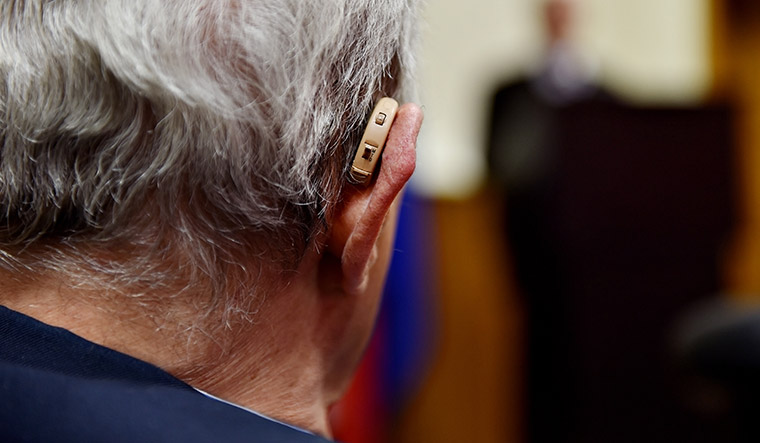Hearing loss affects more than 5 per cent of the world’s population. Left untreated, it can affect communication and can lead to social isolation, anxiety, depression and cognitive decline. One in five such people would benefit from hearing aids or implants.
Hearing loss in senior citizens
Hearing loss can drastically affect the life of a senior citizen, and the severity of the hearing loss is associated with a reduced quality of life. A day in the life of a hearing-impaired older adult may include struggles with the following:
Hearing alarms or telephones; understanding someone while talking on the phone; when several people are talking; when a speaker’s face is unseen; hearing in a car, wind, or traffic; understanding speech on TV; understanding whispers; understanding cashiers or sales clerks; or enjoying “sweet nothings” in a romantic situation.
People with normal hearing often assume that simply saying something louder or turning up the volume will help a hard-of-hearing elder. Volume is not necessarily the issue; difficulties with sound and word discrimination may be involved. The need to repeat responses adds to the negative perception of senior citizens being slow.
Psychological implications
Inability to hear and discern message and meaning can result in feelings of shame, humiliation and inadequacy. It can be highly embarrassing to be unable to behave according to applicable social rules. The feeling of shame linked to hearing loss stems from elders inadvertently reacting in inappropriate and socially unacceptable ways, such as responding to a misunderstood question in an inaccurate fashion. Older adults may think “How stupid I must look!” “How embarrassing!” or “What will others think?”
The desire to hide hearing aids, a visible sign of hearing loss, often arises from the feeling of shame. Society’s value on physical perfection affects everyone, including senior citizens.
Inability to understand verbal communication results in feelings of isolation when elders are left out of group conversations. To avoid shame, they sometimes choose isolation.
Depression and adjustment disorder can occur as a natural response to hearing loss and its subsequent impact on the quality of life. On the other hand, some people have pre-morbid mental health issues and hearing loss simply compounds the problem.
Some elders who are hard of hearing feel isolated or lonely within their own families. They miss the side conversations or easy banter during family outings or conversations.
Communicating with a hearing-impaired person
It is important to speak openly and naturally to elders with hearing loss. Take all feelings seriously and show respect. Don’t speak on behalf of an elder with hearing loss, and if you address the elder in the presence of another family member, avoid using that person as an interpreter if the hard-of-hearing elder doesn’t hear the question. Instead, repeat the question clearly or rephrase in another way and allow the individual to answer for himself or herself.
Mental health in children with severe hearing impairment
Deafness does not in itself cause emotional, behavioural, cognitive or psychiatric problems. However, children with hearing impairment are at greater risk of developing emotional/behavioural problems and neuro-developmental disorders. The incidence of both seems to be higher in deaf children from 'hearing' families.
Lack of effective communication with caregivers, typically in families with hearing parents and deaf children, and consequent lack of or delayed language development is an important environmental causative factors. It may also affect the individual’s cognitive ability and their ability to understand the emotional states of others and develop friendships.
Language and emotions
It is clear that deaf children from hearing families where there is not an adequate level of communication, have a higher incidence of mental health problems than their hearing counterparts. This often seems to be related to a lack of language development caused by either a delayed diagnosis of deafness and/or families failing or being unable to learn how to communicate effectively with their deaf child. This language deficit will have an impact on the essential development, understanding and regulation of emotions.
In clinical practice, mothers have often stated their preoccupation with their child’s sensory impairment, which could distract them from the child’s non-linguistic cues. Hence, the interaction between a hearing mother and a deaf child is more susceptible to poorer emotional regulation, linked to the mother’s potential growing sense of incompetence at communication and inability to tune in to the child in a ‘deaf-aware’ manner.
The value of early intervention
There is evidence that if early diagnosis is accompanied by intervention and support before the baby reaches six months, parental adjustment is better and the child’s language development will improve.
Facilitating better interaction between parents and their deaf child minimises the possibility that the child will develop an emotional disorder.
The writer is MS (ENT), FRCS (Glasgow), has a fellowship in paediatric ENT surgery (Canada), and is head of the ENT and cochlear implant surgery department at Lourdes Hospital, Kochi.



